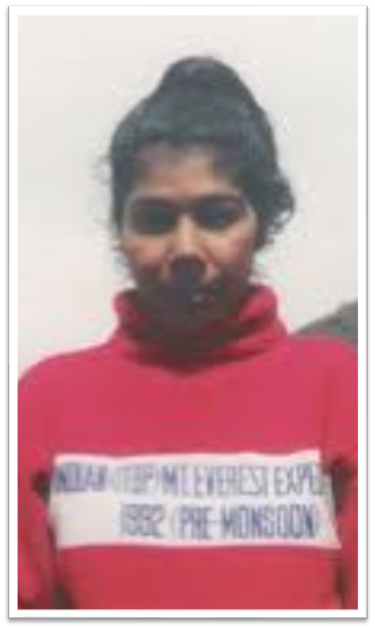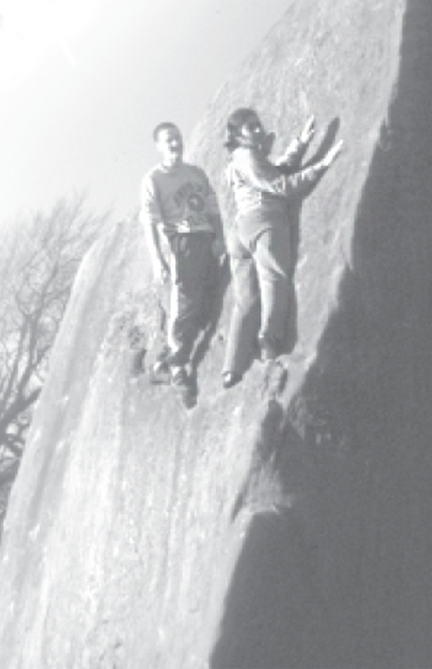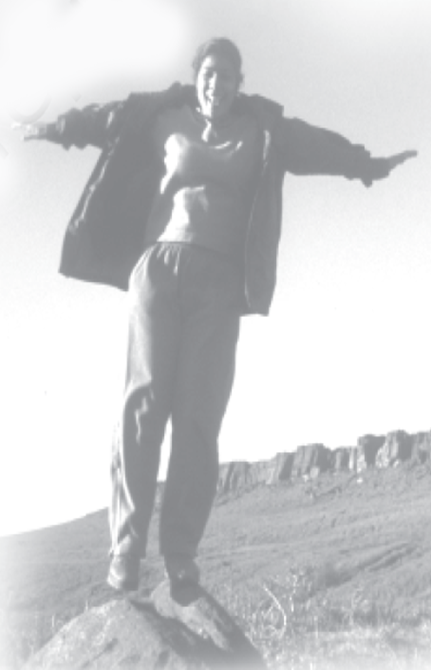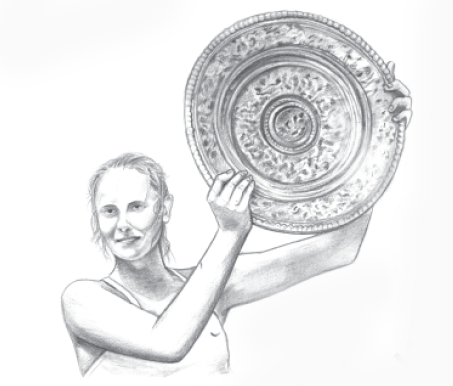Posted by : Empowerment Rules the World
Tuesday, 18 December 2018
CBSE Class IX Beehive Lesson 8 - Reach for the Top
Part 1 Santosh Yadav

Introduction
The article is about Santosh Yadav, the first woman in the world to climb Mount Everest twice. Her story is inspiring. Despite being born in a skewed society which did not welcome the birth of a girl child, where girls were married off at sixteen, she made her own path, followed her desires and achieved world fame.
Lesson and explanation
The only woman in the world who has scaled Mt Everest twice was born in a society where the birth of a son was regarded as a blessing, and a daughter, though not considered a curse, was not generally welcome. When her mother was expecting Santosh, a travelling ‘holy man’, giving her his blessing, assumed that she wanted a son. But, to everyone’s surprise, the unborn child’s grandmother, who was standing close by, told him that they did not want a son. The ‘holy man’ was also surprised! Nevertheless, he gave the requested blessing . . . and as destiny would have it, the blessing seemed to work. Santosh was born the sixth child in a family with five sons, a sister to five brothers. She was born in the small village of Joniya was of Rewari District in Haryana.
When this article was written, Santosh Yadav was the only woman in the world to have climbed the Mount Everest twice. She was born in such a society which was biased towards having a male child over a female child. Although they did not consider the birth of a girl child to be unfortunate, but it was not celebrated either. When Santosh was to be born, a saint, assuming that Santosh’s mother wanted a son, blessed her that she would beget a son. As she already had five sons, Santosh’s grandmother said to the saint that they did not want a son. The saint was amazed to hear this and blessed her alternatively. The blessing turned into a reality as Santosh was born. She was the youngest child, a sister to five brothers. Santosh was born in a village named Joniyawas in Rewari district of Haryana.
The girl was given the name ‘Santosh’, which means contentment. But Santosh was not always content with her place in a traditional way of life. She began living life on her own terms from the start. Where other girls wore traditional Indian dresses, Santosh preferred shorts. Looking back, she says now, “From the very beginning I was quite determined that if I chose a correct and a rational path, the others around me had to change, not me.”
Contentment: satisfaction
Although Santosh’s name means contentment, she was dissatisfied with the traditional way of life. From a young age, she started living life on her own terms. While other girls wore traditional Indian dresses like salwar kameez, she preferred wearing shorts. Santosh recollects that from childhood, she was determined to live life according to what she felt was right for her. If she was right in her way, then others would have to change their way and not her.
Santosh’s parents were affluent landowners who could afford to send their children to the best schools, even to the country’s capital, New Delhi, which was quite close by. But, in line with the prevailing custom in the family, Santosh had to make do with the local village school. So, she decided to fight the system in her own quiet way when the right moment arrived. And the right moment came when she turned sixteen. At sixteen, most of the girls in her village used to get married. Santosh was also under pressure from her parents to do the same.
Affluent: well - to - do
In line with: following or in accordance with, according to
Custom: tradition
Santosh’s parents owned land and were wealthy. They could even afford the money to send their children to study in schools in Delhi which was near their village. Still, due to the prevailing customs, they decided to send Santosh to a school in the village. Santosh decided that she had to take her own path when the right time cam. At the age of sixteen, as most of the girls in her village were married off, she was also pressurised by her parents.
A marriage as early as that was the last thing on her mind. She threatened her parents that she would never marry if she did not get a proper education. She left home and got herself enrolled in a school in Delhi. When her parents refused to pay for her education, she politely informed them of her plans to earn money by working part time to pay her school fees. Her parents then agreed to pay for her education.
the last thing: the least important thing
Politely: gently
For her, getting married was nowhere in the list. She wanted to get proper education before getting married. Santosh left home and got admission in a school in Delhi. Her parents refused to fund her studies and she gently replied that she would herself fund her studies by working part - time. Upon seeing her determination, the parents softened their stand and agreed to pay for her education.
Wishing always to study “a bit more” and with her father slowly getting used to her urge for more education, Santosh passed the high school examinations and went to Jaipur. She joined Maharani College and got a room in Kasturba Hostel. Santosh remembers, “Kasturba Hostel faced the Aravalli Hills. I used to watch villagers from my room, going up the hill and suddenly vanishing after a while. One day I decided to check it out myself. I found nobody except a few mountaineers. I asked if I could join them. To my pleasant surprise, they answered in the affirmative and motivated me to take to climbing.”
Urge: strong desire
Check it out: find out the truth
Answered in the affirmative: gave a positive reply
Santosh wanted to be highly qualified and her father accepted her wish. After passing high school, she joined to Maharani college at Jaipur and stayed at the Kasturba hostel. The Aravalli hills were near the hostel. Often she saw villagers climbing the hills and disappearing behind it. She was curious to know what was beyond the hills and one day, she decided to find out. Santosh found a few mountaineers who allowed her to join them in their mountaineering expedition.
Then there was no looking back for this determined young girl. She saved money and enrolled in a course at Uttarkashi’s Nehru Institute of Mountaineering. “My college semester in Jaipur was to end in April but it ended on the nineteenth of May. And I was supposed to be in Uttarkashi on the twenty-first. So, I did not go back home; instead, I headed straight for the training. I had to write a letter of apology to my father without whose permission I had got myself enrolled at Uttarkashi.”
No looking back: to progress without interruption or impediment
Enrolled: took admission into
Headed straight for: went towards
Since then, Santosh progressed gradually to become an accomplished mountaineer. She saved money to get enrolled in a mountaineering course at the Nehru Institute of Mountaineering at Uttarkashi. As her college semester’s end got delayed and she did not have time to visit home before reporting at the Nehru Institute of Mountaineering, she went directly to the institute and wrote a letter of apology to her father because she had enrolled for the course without his permission.
 Thereafter, Santosh went on an expedition every year. Her climbing skills matured rapidly. Also, she developed a remarkable resistance to cold and the altitude. Equipped with an iron will, physical endurance and an amazing mental toughness, she proved herself repeatedly. The culmination of her hard work and sincerity came in 1992, just four years after she had shyly asked the Aravalli mountaineers if she could join them. At barely twenty years of age, Santosh Yadav scaled Mt Everest, becoming the youngest woman in the world to achieve the feat. If her climbing skills, physical fitness, and mental strength impressed her seniors, her concern for others and desire to work together with them found her a special place in the hearts of fellow climbers. During the 1992 Everest mission, Santosh Yadav provided special care to a climber who lay dying at the South Col. She was unfortunately unsuccessful in saving him. However, she managed to save another climber, Mohan Singh, who would have met with the same fate had she not shared her oxygen with him.
Matured: developed
Thereafter, Santosh went on an expedition every year. Her climbing skills matured rapidly. Also, she developed a remarkable resistance to cold and the altitude. Equipped with an iron will, physical endurance and an amazing mental toughness, she proved herself repeatedly. The culmination of her hard work and sincerity came in 1992, just four years after she had shyly asked the Aravalli mountaineers if she could join them. At barely twenty years of age, Santosh Yadav scaled Mt Everest, becoming the youngest woman in the world to achieve the feat. If her climbing skills, physical fitness, and mental strength impressed her seniors, her concern for others and desire to work together with them found her a special place in the hearts of fellow climbers. During the 1992 Everest mission, Santosh Yadav provided special care to a climber who lay dying at the South Col. She was unfortunately unsuccessful in saving him. However, she managed to save another climber, Mohan Singh, who would have met with the same fate had she not shared her oxygen with him.
Matured: developed
Resistance: the ability not to be affected by something
Equipped: supplied with
Physical endurance: strength
Culmination: end
Scaled: climbed
Santosh went on an expedition every year and improved her skills gradually. She developed immunity to cold weather and heights. Santosh had the qualities of physical strength, mental strength and strong will power. In 1992, four years after her first casual climb on the Aravalli hills, she climbed Mount Everest. She was twenty years of age. Santosh became the youngest woman in the world to climb the peak. Her seniors were impressed by her qualities of physical strength, mental strength and strong will power. Her companions on expeditions found her to be concerned for others and willing to work as a team. During the 1992 expedition to Everest, she tried to save a fellow climber but was unsuccessful. She was successful in saving another fellow climber - Mohan Singh who fell short of oxygen by sharing her oxygen with him.
 Within twelve months, Santosh found herself a member of an Indo-Nepalese Women’s Expedition that invited her to join them. She then scaled the Everest a second time, thus setting a record as the only woman to have scaled the Everest twice, and securing for herself and India a unique place in the annals of mountaineering. In recognition of her achievements, the Indian government bestowed upon her one of the nation’s top honours, the Padma Shri.
Annals: historic records
Within twelve months, Santosh found herself a member of an Indo-Nepalese Women’s Expedition that invited her to join them. She then scaled the Everest a second time, thus setting a record as the only woman to have scaled the Everest twice, and securing for herself and India a unique place in the annals of mountaineering. In recognition of her achievements, the Indian government bestowed upon her one of the nation’s top honours, the Padma Shri.
Annals: historic records
Bestowed upon her: honoured her with
Top honours: highest award
Within the next year, she had joined a group of Indo - Nepalese mountaineer women. Then she climbed the peak the second time, becoming the only woman to have climbed the Everest twice. Santosh made India proud by getting her name recording in the Historic records of mountaineering. The Indian government honoured her achievement by giving her the Padmashri award.
Describing her feelings when she was literally ‘on top of the world’, Santosh has said, “It took some time for the enormity of the moment to sink in... Then I unfurled the Indian tricolour and held it aloft on the roof of the world. The feeling is indescribable. The Indian flag was flying on top of the world. It was truly a spiritual moment. I felt proud as an Indian.” Also a fervent environmentalist, Santosh collected and brought down 500 kilograms of garbage from the Himalayas.
 the enormity of the moment: a very great moment
the enormity of the moment: a very great moment
sink in: be understood
held it aloft: held it up high
fervent: having strong and sincere feelings
Santosh recollects her feelings when she was literally at the top of the world. She took time to realize that she had achieved something big. She hoisted the Indian flag atop Mount Everest, on the highest point of the world. She cannot put the great feeling into words. She felt proud to be an Indian. As she believes in preserving the environment, sher did her bit by bringing down five hundred kilograms of garbage from the Himalayas.
In line with: following or in accordance with, according to
Custom: tradition
Politely: gently
Check it out: find out the truth
Answered in the affirmative: gave a positive reply
Enrolled: took admission into
Headed straight for: went towards

Resistance: the ability not to be affected by something
Equipped: supplied with
Physical endurance: strength
Culmination: end
Scaled: climbed

Bestowed upon her: honoured her with
Top honours: highest award

sink in: be understood
held it aloft: held it up high
fervent: having strong and sincere feelings
Summary
Santosh Yadav was born to wealthy landowners in Joniya was village of Rohtak district in Haryana. She was the youngest child, a sister to five elder brothers. Due to the traditions, she was forced to study in the village school. Since childhood, she was opposed to the customs, preferred wearing shorts in opposition to the traditional dresses like salwar kameez. At the age of sixteen, like other girls in the village, she was forced to get married but she resisted and insisted upon getting educated before getting married. She took admission in a school in Delhi but her parents refused to support her. She accepted it and decided to work part - time to fund her schooling fee. Finally, her parents agreed to support her. Her father accepted her desire to get higher education. After high school, Santosh joined the Maharani college at Jaipur and lived at the Kasturba hostel. There she saw the villagers climb the Aravalli hills and was curious to know what was at the other side of the hills. She joined a group of mountaineers there and hence, undertook her first climbing expedition.
Within four years, in 1992, she climbed Mount Everest. Her qualities of determination, physical and mental strength impressed her seniors. Her fellow climbers appreciated her concern for others and willingness to work in a team. She saved the life of a fellow climber named Mohan Singh by sharing her oxygen cylinder with him. She joined an Indo - Nepalese woman expedition and climbed Everest twice, thus becoming the first woman in the world to climb the peak twice.
Santosh cannot describe the immense feeling of happiness and pride when she was on top of the world. As she hoisted the Indian flag, she felt proud to be an Indian. Being an environmentalist, she brought down five hundred kilograms of garbage from the himalayas.
CBSE Class IX Beehive Lesson 8 - Reach for the Top
Part 2 Maria Sharapova

Introduction to the lesson
A Russian girl, Maria Sharapova, reached the summit of women’s tennis when she was barely eighteen. As you read about her, see if you can draw a comparison between her and Santosh Yadav.
Maria Sharapova’s story of success as she became the top seeded woman tennis player in the world motivates us. She overcame all the hurdles and bore humiliation too in order to achieve her dream. Maria’s hunger for success and her competitive spirit kept her going.
Explanation
THERE is something disarming about Maria Sharapova, something at odds with her ready smile and glamorous attire. And that something in her lifted her on Monday, 22 August 2005 to the world number one position in women’s tennis. All this happened in almost no time. Poised beyond her years, the Siberian born teenager took just four years as a professional to reach the pinnacle.
Disarming: likeable
At odds with: in conflict with
Poised: calm, elegant
Pinnacle: the most successful point
There is some quality in contrast to Maria Sharapova’s smile and glamour, which makes her likeable. It is this quality that helped her achieve success as she attained world number one position in women’s tennis on Monday, 22 August 2005. Maria’s calmness and elegance is beyond her age. She was born in Siberia, Russia and as a teenager, she took only four years of training to become the top seeded woman tennis player.
However, the rapid ascent in a fiercely competitive world began nine years before with a level of sacrifice few children would be prepared to endure. Little Maria had not yet celebrated her tenth birthday when she was packed off to train in the United States. That trip to Florida with her father Yuri launched her on the path to success and stardom. But it also required a heart-wrenching two-year separation from her mother Yelena. The latter was compelled to stay back in Siberia because of visa restrictions. The nine-year-old girl had already learnt an important lesson in life — that tennis excellence would only come at a price.
Rapid: fast
Ascent: growth
Endure: suffer patiently
Heart - wrenching: extremely sad
The fast growth of her career started nine years ago when she made a big sacrifice which can be made by very few children of that young age. She had not even turned ten when she was sent to Florida, USA with her father for training in tennis. She was extremely sad as she had to spend two years’ separation from her mother Yelena. Maria’s mother was forced to stay back in Siberia because she did not have the permit to travel to the US. At the tender age of nine, Maria learned that in order to excel at tennis, she would have to make many sacrifices.
“I used to be so lonely,” Maria Sharapova recalls. “I missed my mother terribly. My father was working as much as he could to keep my tennis-training going. So, he couldn’t see me either.
Maria recollects that she used to remain alone and missed her mother a lot. Her father worked hard to fetch money for her needs and so, he also could not meet her.
“Because I was so young, I used to go to bed at 8 p.m. The other tennis pupils would come in at 11 p.m. and wake me up and order me to tidy up the room and clean it.
Maria was very young and so, she would go to sleep at 8 pm. The other students would return at 11 and would wake her up, ordering her to clean the room.
“Instead of letting that depress me, I became more quietly determined and mentally tough. I learnt how to take care of myself. I never thought of quitting because I knew what I wanted. When you come from nothing and you have nothing, then it makes you very hungry and determined . .. I would have put up with much more humiliation and insults than that to steadfastly pursue my dream.”
Depress: sadden
Quitting: leaving
Pursue: follow
Maria did not get depressed by all this. Instead she became determined and mentally tough. She took care of herself. She never thought of leaving the training because she was determined to achieve her aim. When a person has nothing, he craves and becomes determined to get it. She says that she would have borne greater humiliation and insults also in order to achieve her dream.

That toughness runs through Maria even today. It was the key to her bagging the women’s singles crown at Wimbledon in 2004 and to her meteoric rise to the world number one spot the following year.
Bagging: winning
Meteoric: very rapid
Maria retains her determination till present day. This determination led her to grab the women’s singles trophy at the Wimbledon Championship in 2004, followed by the rapid climb to the top position in 2005.
While her journey from the frozen plains of Siberia to the summit of women’s tennis has touched the hearts of tennis fans, for the youngster herself there appears to be no room for sentiment. The straight looks and the answers she gives when asked about her ambition make it amply clear that she considers the sacrifices were worth it. “I am very, very competitive. I work hard at what I do. It’s my job.” This is her mantra for success.
Sentiment: emotional feeling
Ambition: goal, aim
Amply: plentifully
Tennis fans feel emotional to know about Maria’s journey from the frozen region of Siberia but she is not moved by it. She gives straight answers when questioned about her aims which imply that she accepts that the hurdles and challenges she faced were worth the result that she got. She adds that she is competitive and works hard as she considers it to be a part of her work. This is Maria’s secret for success.
Though Maria Sharapova speaks with a pronounced American accent, she proudly parades her Russian nationality. Clearing all doubts, she says, “I’m Russian. It’s true that the U.S. is a big part of my life. But I have Russian citizenship. My blood is totally Russian. I will play the Olympics for Russia if they want me.”
Parades: displays
Maria’s speech has an American accent but she is proud to be a Russian. She says that USA is a big part of her life because she trained there but in the core of her heart, she is a Russian. She holds the citizenship of Russia, her ancestors are Russians and she is willing to represent Russia at the Olympics too.
Like any number of teenaged sensations, Maria Sharapova lists fashion, singing and dancing as her hobbies. She loves reading the novels of Arthur Conan Doyle. Her fondness for sophisticated evening gowns appears at odds with her love of pancakes with chocolate spread and fizzy orange drinks.
Sophisticated: fashionable
At odds with: in disagreement with
Fizzy: aerated
Like other teenagers her age, Maria’s favourite pastimes are fashion, singing and dancing. She likes to read novels written by Arthur Conan Doyle, the creator of Sherlock Holmes. She likes to wear fashionable evening gowns. Looking at her fit body, it is unbelievable that she likes to eat pancakes with chocolate spread and drinks aerated orange flavoured drinks.

Maria Sharapova cannot be pigeon-holed or categorised. Her talent, unwavering desire to succeed and readiness to sacrifice have lifted her to the top of the world. Few would grudge her the riches she is now reaping. This is what she has to say about her monetary gains from tennis: “Of course, money is a motivation. Tennis is a business and a sport, but the most important thing is to become number one in the world. That’s the dream that kept me going.”
Pigeon-holed: classified, categorized
Unwavering: steady, firm
Grudge: oppose, mind
Maria cannot be put into a particular category. Her talent, urge to succeed and sacrificing nature helped her reach the top position in women’s tennis. No one will oppose the benefits that she is getting now because she made many sacrifices to get them. She says that money does motivate her to work hard. Tennis is both a sport and a business but the most important aspect for her was to reach the top spot in women’s tennis. It was this dream that kept her working further.
Summary
This write up about Maria Sharapova inspires us to remain determined and make sacrifices in order to fulfil our dreams. On 22 August 2005, Maria became the top seeded player in the world women’s tennis player rankings. She made great sacrifices to achieve her goal.
At the tender age of nine, she left her home in Siberia, Russia to get training in tennis. She went to Florida in USA with her father. Maria suffered a painful separation from her mother for a period of two years. She could not see her father too as he remained busy working, arranging funds for all her needs. She was bullied by her seniors and being a foreigner, she had to suffer all that patiently. Maria did not feel depressed, rather she was prepared for greater insults too in order to achieve her aim.
Her mantra for success is to work hard and face the toughest competition. Although she was trained in the US, she considers herself to be a Russian and is wiling to represent Russia at the Olympics too. Her favourite hobbies are fashion, singing and dancing. She loves reading novels written by Arthur Conan Doyle. Her love for fashionable evening gowns is in contrast to her liking for pancakes with chocolate spread and orange flavoured aerated drinks. The monetary gains and the fame incurred by Maria are well deserved.








